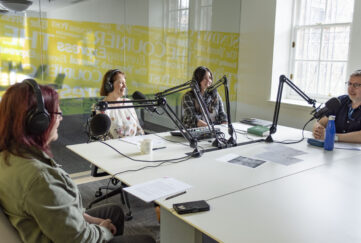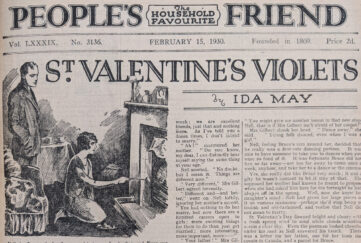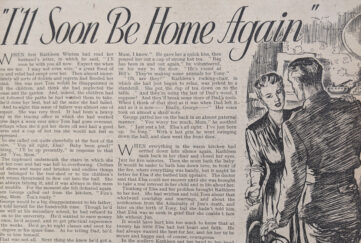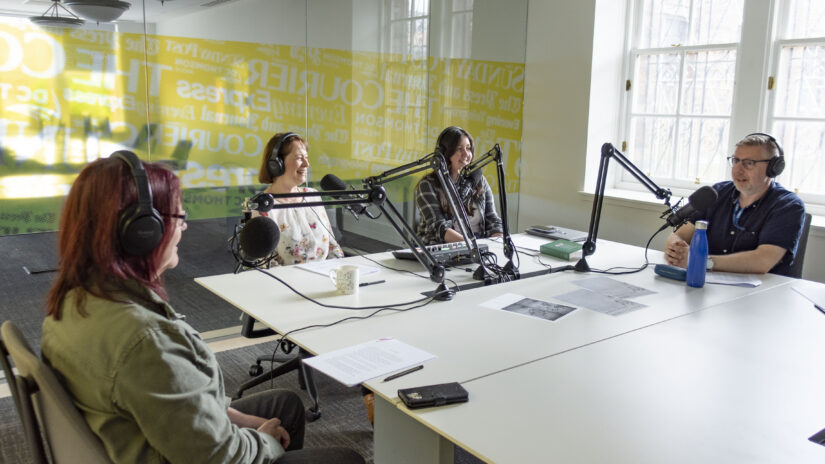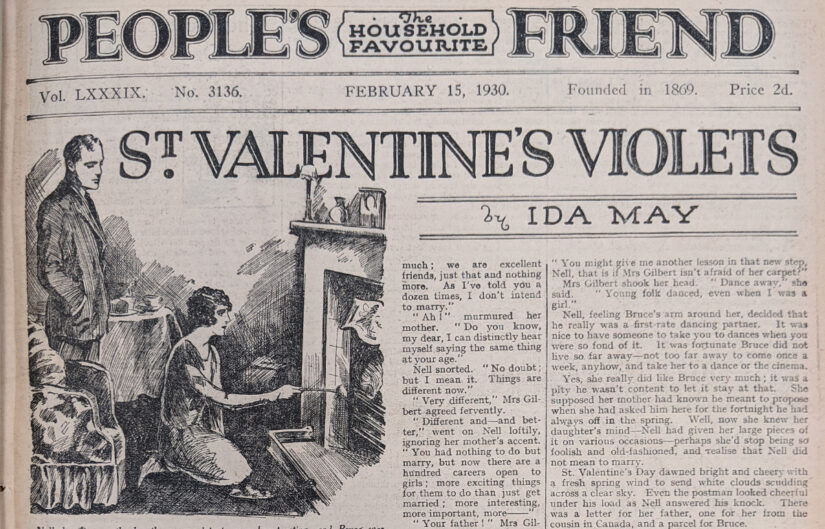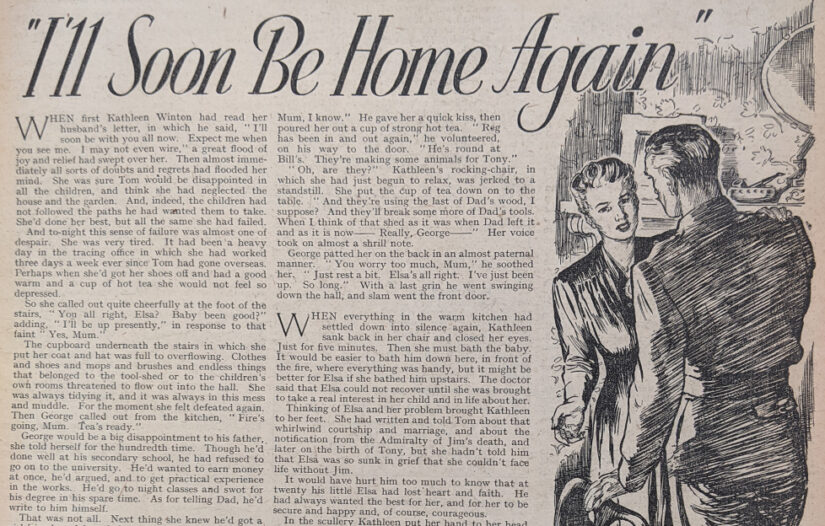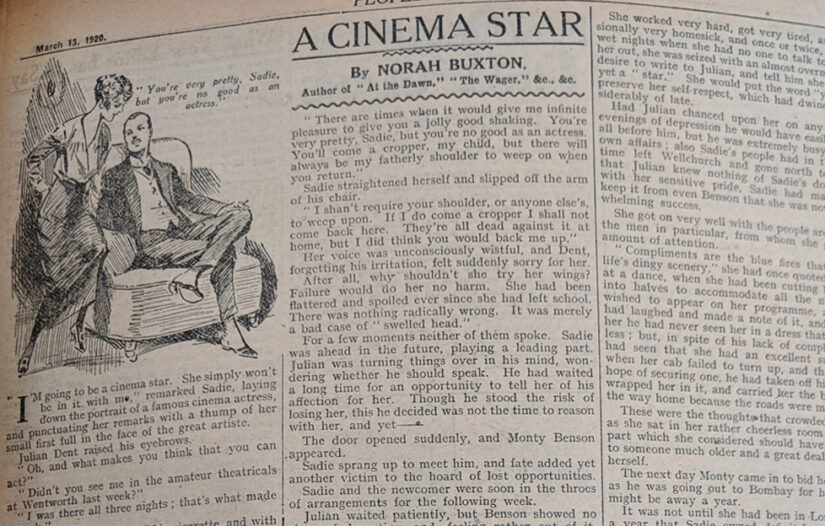Reading Between The Lines S3EP11: “The Cup Final & The Trouser Tree”
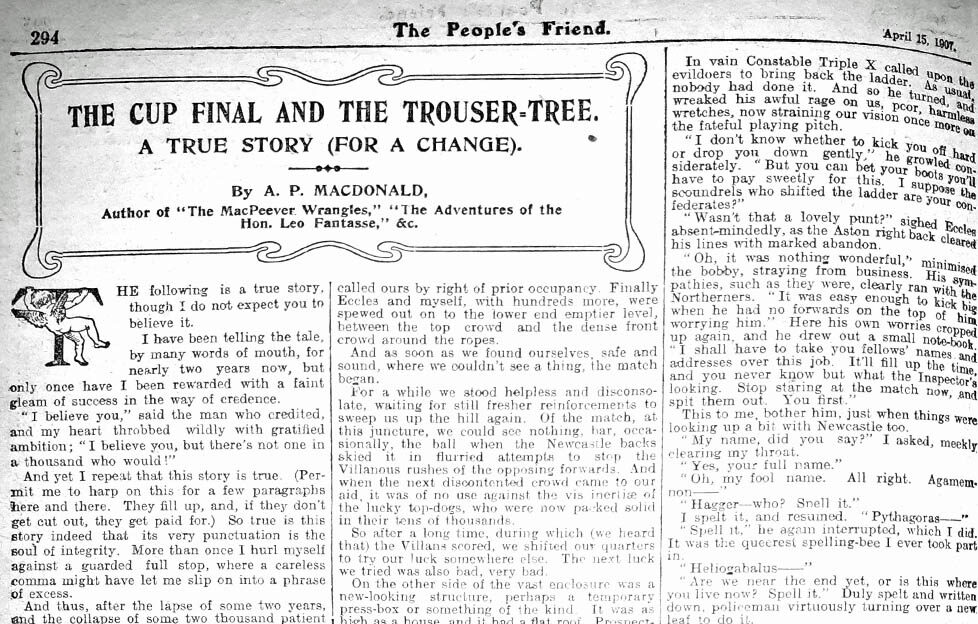
This episode of the Reading Between The Lines podcast is “The Cup Final and The Trouser Tree” by A.P. Macdonald, first published in April 15, 1907. Listen along to the episode as you read and let us know what you think!
The following is a true story, though I do not expect you to believe it.
I have been telling the tale, by many words of mouth, for nearly two years now, but only once have I been rewarded with a faint gleam of success in the way of credence.
“I believe you,” said the man who credited, and my heart throbbed wildly with gratified ambition; “I believe you, but there’s not one in a thousand who would!”
And yet I repeat that this story is true. (Permit me to harp on this for a few paragraphs here and there. They fill up, and if they don’t get cut out, they get paid for.) So true is this story that indeed its very punctuation is the soul of integrity. More than once I hurly myself against a guarded full stop, where a careless comma might have let me slip on into a phrase of excess.
And thus, after the lapse of some two years, and the collapse of some two thousand patient listeners, I rush into print with the story that I may blazon it abroad to the world at large, and have done with it.
When Newcastle United met Aston Villa in the final for the Football Association Cup, I went down with a friend to the Crystal Palace to see the match. He was Aston Villa, I was Newcastle United, and the result—which we learned on the ground, and got confirmed in the football special editions later—was two-nothing against me.
No, I did not see enough of the match to know any other way. Yes, I was there, as I have already stated. But if I have to answer questions on trivial points of detail such as these, we shall never get to the story proper. I have always noticed, when relating the anecdote, people begin to want to cross-examine me at this stage. If readers will only wait, all will be thoroughly explained and—disbelieved.
Besides my friend and me, there were a lot of other people present; I should say well on for a hundred thousand. They were, to tell the truth (as guaranteed), far too numerous for us to stand any reasonable chance of seeing the match at all. My friend, whose name is Eccles, will bear me out in this. He was, and for the matter of that is, a most respectable man. Upon his sworn statement, which I hope to append, I greatly rely to bring home a conviction to the reader—this story is true.
Well, we arrived on the ground at least two hours before the advertised time of the kick-off. We took up a nice position on some high ground, and were thoroughly tired out with standing long before the referee started the game.
The day had promised to be cool, even damp, and we had brought out mackintoshes. But the day broke its promise, and simply glared down red-hot upon the sweltering crowd. The only cool things on the ground were the bizarre black and white umbrellas sported by great numbers of Novocastrians, who thus honoured their Club’s colours. Tired out, we, and thousands more around us, lay down to swelter in comfort.
Fifteen minutes before the teams appeared several fresh thousands, bright and unjaded newly arrived by special trains, rushed our position without a moment’s warning. It was all we could do to scramble to our feet, and save our lives and waterproofs before we were jammed back by the newcomers. The reaction came immediately, and a whole herd of us were rushed violently down the slope we had fondly called ours by right of prior occupancy. Finally Eccles and myself, with hundreds more, were spewed out on to the lower and emptier level, between the top crowd and the dense front crowd around the ropes.
And as soon as we found ourselves, safe and sound, where we couldn’t see a thing, the match began.
For a while we stood helpless and disconsolate, waiting for still fresher reinforcements to sweep us up the hill again. Of the match, at this juncture, we could see nothing, bar, occasionally, the ball when the Newcastle backs skied it in flurried attempts to stop the Villanous rushes of the opposing forwards. And when the next discontented crowd came to our aid, it was of no use against the vis inertia of the lucky top-dogs, who were now packed solid in their tens of thousands.
So after a long time during which (we heard that) the Villans scored, we shifted our quarters to try our luck somewhere else. The next luck we tried was also bad, very bad.
On the other side of the vast enclosure was a new-looking structure, perhaps a temporary press-box or something of the kind. It was as high as a house, and it had a flat roof. Prospecting round it we found a ladder lying invitingly on the ground tucked close in at the back of the building. Though we knew we were doing wrong, yet, with considerable immoral courage, we erected the ladder, and climbed up. Oh, the blissful rapture of the view we got to reward us for our ingenuity. But, alas, our triumph was short lived. A horde of other would-be spectators rushed to the foot of the ladder to follow our bad example. A policeman noticed the movement, and crushed it. So far as that went he was quite right. A roof of laths couldn’t be expected to stand the weight of a mob of football enthusiasts. It took it all its egg-box strength to bear us. And we were getting on nicely by ourselves. But our little game had been given away by its popularity. It is a strange thing that a man cannot invent an innocent little iniquity for his own private use without having a host of imitators infringing his patient.
“Come out of it,” yelled Robert to us. We didn’t hear him, of course. Great enthusiasm prevailed, and the crowd were shouting themselves hoarse at the desperate efforts of Newcastle to equalise.
The constable in the execution of his duty, bawled a lot of rude things at us, but, not hearing them, we paid no attention to him. As history shows, when the mountain wouldn’t come to Mahomet, there was nothing for it but to reverse the engine. And so Robert Mahomet was presently mounting the ladder.
We tried to look pleased to see him when he crawled over and shook us by the scruffs of our swan-like necks. His own smile was something similar. He said it was like our beastly necks to give him all this trouble for nothing. We asked him wherein we had done wrong, and he replied most affably that we would jolly soon find out when we got penal servitude for life, if we didn’t get hung straight off the reel as we deserved.
Seeing he was so pressing, we had to yield to his blandishments, and move back to the ladder whence we came. With one last fond glance at two rival half-backs joyously charging each other down, we reluctantly moved to the edge. But when we got there, the ledgeboard was bare, and so the poor policeman didn’t know what to do.
It seemed that no sooner had the constable climbed on to the roof, than the vengeful crowd he thwarted had removed the ladder, and with a laudable desire for tidiness put it neatly back in its proper place.
In vain Constable Triple X called upon the evildoers to bring back the ladder. As usual, nobody had done it. And so he turned, and wreaked his awful rage on us, poor, harmless wretches, now straining our vision once more on the fateful playing pitch.
“I don’t know whether to kick you off hard or drop you down gently,” he growled considerately. “But you can bet your boots you’ll have to pay sweetly for this. I suppose the scoundrels who shifted the ladder are your confederates?”
“Wasn’t that a lovely punt?” sighed Eccles absent-mindedly, as the Aston right back cleared his lines with marked abandon.
“Oh, it was nothing wonderful,” minimised the bobby, straying from business. His sympathies, such as they were, clearly ran with the Northerners. “It was easy enough to kick big when he had no forward on the top of him worrying him.” Here his own worries cropped up again, and he drew out a small notebook. “I shall have to take you fellows’ names and addresses over this job. It’ll fill up the time, and you never know but what the Inspector’s looking. Stop staring at the match now, and spit them out. You first.”
This to me, bother him, just when things were looking up a bit with Newcastle too.
“My name, did you say?” I asked, meekly clearing my throat.
“Yes, your full name.”
“Oh, my fool name. All right. Agamemnon—”
“Hagger—who? Spell it.”
I spelt it, and resumed. “Pythagoras—”
“Spell it,” he again interrupted, which I did. It was the queerest spelling-bee I ever took part in.
“Heliogabalus—”
“Are we near the end yet, or is this where you live now? Spell it.” Duly spelt and written down, policeman virtuously turning over a new leaf to do it.
“Pygmalion—”
“I don’t want to know whether you keep pigs for a living or only for a hobby. I wanted your Christian names, not the names of a lot of heathen images and what not. What’s your last name?”
“Stubbs. Shall I spell it?”
“He is the world-famous author of ‘Stubb’s Gazette’ you know” put in Eccles dutifully.
“You’ll fill a page in the ‘Police Gazette’ yourself by and by if you ain’t careful,” cautioned the constable. “Shell out your own name now. I only allow two goes this time, first and last.”
“John Eccles.”
“Short for Jonathan Ecclesiastes, I suppose! Profession?”
“Gentleman.”
“He doesn’t really make money at it, you understand, constable,” I intervened helpfully. “He only professes to be one; he doesn’t practise.”
“His profession’s that of a story-teller,” reciprocated Eccles.
“He’d better not practise on me anyhow,” warned Bobs.
“Just freeze on the United centre,” I burst in. “He’ll equalise as sure as oysters.”
The unreliability of oysters when shooting for goal was here strikingly illustrated, for the centre shot wide.
How gladly would we have extended our delightful two minutes’ parley with the policeman (in full view of the match). But it was not meant to be. Another policeman hove in sight, and in response our own private policeman’s call, the ladder was again reared, and down we regretfully had to clamber. I offered to give our Robert some more of my nom-de-plumes, and Eccles was willing to invent a few fictitious addresses, but the policeman said he was tired, and told us to run away and play.
If the reader belongs to the fair sex, or being male that takes no stock in football, she or he may think that, after this reverse we wouldn’t make any more attempts to see the match. Wouldn’t we indeed! And just didn’t we!
After this reverse we initiated no fewer than four more distinct campaigns of agreeably diversified character, with the avowed object of seeing another scrap or two of the match or perishing in the attempt.
To miss out the description of them is simply to waste good copy, and throw away good money. And yet, I cannot do more than barely allude to one or two of them ere I retail the grand finale.
On the ground were men with an invention which theoretically enabled one to see over the heads of the crowd. Roughly speaking, the contrivance consists of a mirror hoisted on the top of a pole. It is fixed at an angle which enables it to reflect what it “sees” in a second mirror nearer mother earth. I tried one, for sixpence. But with fifty other people trying to look over my shoulders—for nothing—it didn’t work well in practice. I got my camera obscura into focus by sheer brute strength. Eccles staved off the surging crowd like a Hercules, while I held on to the machine with both hands and one eyeball, which was nearly gouged out, and trodden on, every time I winked. Having obtained my focus, I found myself merely looking down the back of somebody’s neck, and I could hardly expect to see much of the match there, could I now? There was far more of the obscura than the camera about the invention. It requires perfecting, with steel barriers round the operator or some such simple addition.
For the next attempt we made to see the field of play, we paid dearly. Some trampish-looking individuals came along bearing a trestle table. We asked no questions as to where they had stolen it, and they only asked us for two shillings each for the privilege of standing on it. The worst of it was that they asked too many people the same question, with the consequence that we and the other mugs who boarded the pirate craft walked the plank. More correctly speaking, we walked through the plank the instant we could say “We are seven”. The most of the seven, however, did not confine themselves to poetry in what they said, and, shocked, we once more moved away to a fresh place.
In that corner of the spectatorial ground which was nearest the Penge entrance, Eccles picked up what he said was a great bargain. Some honest sons of toil had torn up, by the very roots, one of those heavy iron-bound and iron-backed forms which one sees in public parks. They are very strong, but their only ornaments are the lovers who occasionally sit on them. One of these benches had been lugged from some far away sunny clime in another portion of the Palace grounds, and had been planted near a pole of some sort.
For sixpence net lessees were allowed by the temporary landlords to stand on the top rail of this bench, from which it was just possible to get a bird’s-eye view of the game in the plain below. To steady oneself one had to hold on to his next neighbour, the whole responsibility for balance ultimately resting with the right hand man, who hugged the pole in fond embrace for all he was worth.
Bang went another sixpence each from us two Jugginses. Up we went, I to cling convulsively to the left biceps of a brawny sailor man. His cap betokened that he belonged to H.M.S Towzer, or some such elegantly named and dignified battleship. Eccles clung still more convulsively to me, pinching my left arm black and blue. And so on right along the rail, and I can only imagine the swaying unit at the extreme left having a fit the whole time.
Presently I got down to have a standing rest on terra firma, Eccles hooking on to the sailor man. And here the strange thing happened which nobody who doesn’t know me personally—and only one of those who do—will credit.
The tall, stately trees at our backs were, as is usual at a big Palace match, literally black with men and boys, perched on the branches like crows. I turned round, and was glancing aimlessly about me, when—just my luck—another goal was got, with me not in a position to see it. I could see it was Villa that had scored, because Eccles was making precisely such an exhibition of himself (under difficulties) as I should have made had Newcastle scored. Everywhere save in the staunch bosoms of Newcastle supports like myself pandemonium reigned supreme. But as I gazed around in cool, collected wonder at the insensate full people getting so excited over a mere goal I got such a shock that I haven’t quite got over it yet. Right from the loftiest bough of the tallest tree, as it seemed to me, there fell a man who had climbed that dizzy height. From branch to branch he crashed and crackled, making frantic snatches at ever-snapping twigs and ever-treacherous boughs. All eyes save mine were naturally fixed on the field at the moment of the goal. Or if some chance twee-dweller saw the man falling what could he do but avert his gaze in horror, as I did mine, when the last crash came and the poor fellow came hurtling to the ground.
When I looked again a second or two later the tragedy was over. Low comedy, so frightfully low as to verge on the vulgar, had taken its place. The man was on his feet, unhurt, I am glad to state, with hardly a scratch to show, but oh! What a surprised look he wore, I wore, we both wore.
For, gentle reader (believe me, I blush as I write it), in the Darwinian descent of that man his trousers had stayed on the tree. There he stood, poor fellow, in his undergarments, shaking his head woefully at me—his only sympathiser. Nobody else, so far as I could gather, had seen the accident. And it took us both all our time to see the trousers. For the worst of it, from his point of view (at the foot of the tree) has yet to be told. Not only were the indispensable garments hanging up far out of reach, amidst broken boughs, bursting buds and other sentimental surroundings, but they weren’t hanging in the same place. One leg flapped, in moody Newcastle fashion, on the early summer breeze, about forty feet up. The other one waved a triumphant “well done” to the Villans from very near the top of the tree whence the man had fallen.
Even that wasn’t the worst of it, for both sections had got ripped open from top to bottom, and were now mere aprons.
There are beautiful stories knocking about—I have even tried to write some myself—concerning rich men who give their priceless fur overcoats to poor shivering beggars on the spur of the moment. So well they might, and good luck to them, but I feel sure nothing would induce these rich men, chivalrous as they might be, to hand over their priceless tweed trousers at a moment’s notice. At any rate, anxious though I was to help the man, and show sympathy in practical form, I didn’t give him mine. For many a good cause I would willingly sacrifice wealth and fame (and all the other things I don’t have and don’t expect), but never one ewe pair of pantaloons.
If I’d had some to spare now, I’d have given him a complimentary pair with the author’s compliments, but I never did believe in the extravagant practice of wearing two pairs at once. Still I did what I could for him.
The man was naturally too shaken down to climb up again, and, as it happened, there was nobody else on his particular tree, which was very far back, to render any aid. So I drew the man o’ warsman’s attention to the poor wretches predicament and he took in the situation at a glance. Leaving his pole for the moment, he ran over to the tree, swarmed up it like a monkey, reached one rag, rolled it up like a cannon ball, and shot it clear of the tree to the ground. Ditto with no. 2 rag. Then he scrambled down, and ran back to his post without exhibiting any trace of emotion other than eagerness to behold the finish of the match. Good lad that he was, may H.M.S Towzer have promoted him long ere this!
I thereupon turned myself into a kind of canvassing agent for pins, and assisted the victim to tinker up a very respectable pair of garments in which he might proceed on his way home rejoicing that things were no worse. I should fancy Adam’s first effort at bifurcated garments would closely resemble that pair in cut and finish, but—they did . . .
And now you ask me for a line with the story, and I give it to you. Please swallow and digest what Mr Eccles says:—
“I hereby swear that as I did not see the trouser-tree incident I cannot hold myself responsible for what really happened or did not happen in that connection. At the same time, the other incidents appear to me to be as reasonably true as should be expected from any penny-a-line paragrapher who has living to earn, as honestly as he can.
“It is the case that the liner and the sailor left me very much in the lurch on such occasions as they jumped overboard. Now that I remember, too, the story-teller borrowed two pins from me (all I had), near the close of the match, though I do not recollect any attempt at paying them back.” (Signed) “John Eccles”
Could anything be more circumstantial or convincing than that?
Read and listen to our previous Reading Between The Lines stories.


